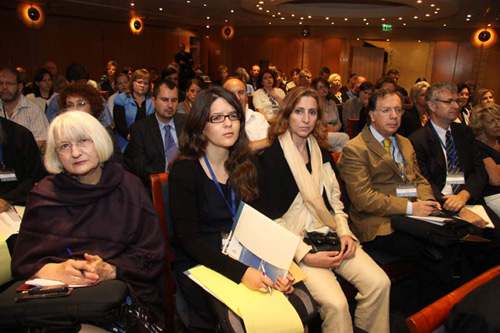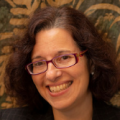
Opening Session of the Seventh International Conference on Holocaust Education, June 12-13, 2010
Remembrance ceremonies and events paying respect to the victims of the Holocaust began to be organized even before the Second World War ended. Official Commemoration ceremonies of Yom Hashoah, Holocaust Martyrs' and Heroes' Remembrance Day, beginning at sunset on the twenty-seventh day of the Jewish month of Nisan, became institutionalized in the State of Israel in the 1950s.
On November 1, 2005, the General Assembly of the United Nations designated January 27 as an annual International Day of Commemoration to honor the victims of the Holocaust. Approximately sixty years earlier, on January 27, 1945, Soviet forces liberated the Auschwitz-Birkenau Nazi extermination camp complex.
Approximately three-and-a-half years later, on April 2, 2009, the European Parliament in Brussels passed the “European Conscience and Totalitarianism” resolution, leading to the annual marking of August 23 as a day recalling the millions of victims that were deported, imprisoned, tortured and murdered by totalitarian and authoritarian regimes during the twentieth century in Europe. According to the text of this European Union resolution, “ …from the outset European integration has been a response to the suffering inflicted by two world wars and the Nazi tyranny that led to the Holocaust and to the expansion of totalitarian and undemocratic Communist regimes in Central and Eastern Europe, as well as a way of overcoming deep divisions and hostility in Europe through cooperation and integration and of ending war and securing democracy in Europe…”
Clearly, European policy makers did not randomly choose August 23, but rather purposefully sought to commemorate the secretly signed Ribbentrop-Molotov agreement in Summer 1939.
The “European Conscience and Totalitarianism” remembrance day does not implicitly equate the crimes against humanity perpetrated by Nazi Germany and the Communist USSR. However, the crimes of Nazism and Stalinism essentially become blurred even though the uniqueness of the Holocaust is specifically noted. Overall, it appears that this August 23 remembrance day is rooted in deep historical resentment toward the Soviet regime.
In light of recent debates, reports and statements within international circles that have sparked many questions surrounding historical narratives, the International School for Holocaust Studies at Yad Vashem is organizing its seventh international conference on the Holocaust and Education focusing on “Shoah Education and Remembrance in Hindsight and in Foresight: Text and Context,” June 12-13, 2010. More than 200 participants representing approximately 40 countries are taking part in sessions focusing on the current challenges of historical memory.
This international conference, organized under the auspices of the Israeli Chairmanship of the Task Force for Internation Cooperation on Holocaust Education, Remembrance and Research is geared for decision makers in the field of education and culture. During these proceedings, world renowned scholars such as Alain Finkielkraut, Samuel Pisar, Yehuda Bauer and others will focus on a number of questions, such as: How is educating about and remembering the Holocaust relevant to young people today who seek to accurately understand what occurred as well as to take responsibility for the truth about the past? Do the many memorial days throughout the year diminish or hightlight the meaning of the Holocaust? How do we authorize the teaching about different historical contexts without a competition between the suffering of victims of totalitarianism?
Although crimes under Soviet rule should be annually commemorated, they should not be linked to the Nazi regime. After all, what is our responsibility toward educating the future leaders of tomorrow about European history? Should different historical contexts be merged into one over-arching text about totalitarianism? Does such a merging blur all meaning out of the events?
All remembrance days provide educators with an opportunity to grapple with the complexity of history. Nevertheless, commemorative events should not come in place of educators creating an active learning process together with their students in their classrooms. Unquestionably, teaching about difficult and complex subject matter is a major challenge. However, on the basis of our professional experience at our School with educators from all over the world, we know that studying about the Holocaust, like all events in history, should not be oversimplified or taught out of context.
Ultimately, it is hoped that this conference will highlight the axiom of remembrance leading to promoting educational responsibility rather than festering resentment among today’s youth.










